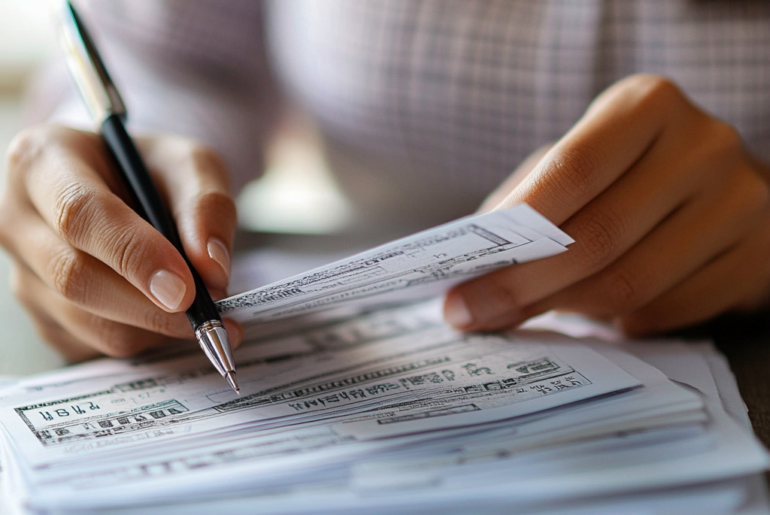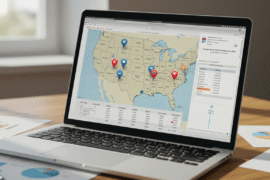This article may contain references to products or services from one or more of our advertisers or partners. We may receive compensation when you click on links to those products or services. Nonetheless, our opinions are our own.
The information presented in this article is accurate to the best of our knowledge at the time of publication. However, information is subject to change, and no guarantees are made about the continued accuracy or completeness of this content after its publication date.
Have you ever looked at your paycheck and seen a deduction that made you stop and think, “What is this tax on my paycheck?” A levy can be scary, especially if you don’t know what it is or how to deal with it. You are not the only one who feels this way. To get your finances back under control, you need to know why a paycheck levy happens. We’ll explain what paycheck levies are, why they happen, and what you can do to fix the problem. You’ll know exactly what to do next with confidence.
- The Levy on Your Paycheck
- Common Reasons for Payroll Levies
- Evaluating Your Finances After a Levy
- Steps to Resolve a Payroll Levy
- How to Communicate with Creditors and Tax Authorities
- Rebuilding Your Finances After a Levy
- Conclusion
- Frequently Asked Questions
- Why is there a levy on my paycheck?
- Who can place a levy on my paycheck?
- How much of my paycheck can be levied?
- How do I find out more about the levy?
- What steps can I take to resolve the levy?
- Can I appeal a paycheck levy?
- What if I can’t afford to pay the debt?
- Will the levy affect my credit score?
- What happens if the levy is not resolved?
- Recommended Reads
The Levy on Your Paycheck
If you see a levy on your paycheck, you should know what it means. A levy is a legal claim on your income to pay off debts you owe, like unpaid taxes, court judgments, or other financial obligations. It can be scary to see part of your paycheck withheld, but this is done to make sure that debts are paid off.
Here are some of the most common reasons levies are issued:
- Tax obligations: The most common reason is unpaid taxes. The IRS or state tax agencies can legally garnish wages until the tax debt is resolved.
- Court judgments: If you’ve lost a lawsuit and owe money, a creditor can request a wage levy through the courts.
- Unpaid child support: Family courts can enforce child support payments through paycheck levies when someone falls behind.
To address a levy, focus on resolving the underlying issue. This might involve setting up a repayment plan, negotiating with the creditor, or reassessing your budget to better manage debts.
Common Reasons for Payroll Levies
When a payroll levy appears on your paycheck, the cause is usually tied to a specific unresolved financial obligation. These are some of the most frequent reasons:
- Unpaid taxes: If you’ve failed to pay federal or state income taxes or ignored tax notices, the IRS or state authorities may issue a wage levy.
- Child support arrears: Falling behind on court-ordered child support can trigger automatic deductions through your paycheck.
- Student loan default: Defaulting on federal student loans allows the government to garnish wages without court involvement.
- Debt judgments: Creditors can obtain a court judgment against you and legally enforce it by garnishing wages.
Knowing these causes can help you take preventive or corrective action before the situation escalates.
Evaluating Your Finances After a Levy
If you see a levy on your paycheck, you need to check your finances right away. Start by getting important papers like pay stubs and letters from the IRS, courts, or other creditors. Knowing why the levy was put in place will help you figure out what to do next.
Consider the following:
- Income: Identify all sources of income and how the levy affects your take-home pay.
- Expenses: Create a list of monthly expenses to find areas where you can cut back.
- Debts: Take stock of existing obligations and prioritize them based on urgency.
Once you’ve reviewed your finances, develop a basic action plan. Prioritize important bills, explore new payment arrangements with creditors, and consult a tax professional if tax-related issues are involved.
| Action Item | Timeline |
|---|---|
| Review financial documents | Promptly |
| Create expense list | Within 3 days |
| Contact creditors | Within 1 week |
| Consult tax professional | As needed |
Voted "Best Overall Budgeting App" by Forbes and WSJ
Monarch Money helps you budget, track spending, set goals, and plan your financial future—all in one app.
Get 50% OFF your first year with code MONARCHVIP
Steps to Resolve a Payroll Levy
Addressing a payroll levy involves knowing your rights and responding strategically. Start by reviewing all communications from the creditor or agency that initiated the levy.
Follow these steps:
- Contact the creditor: Reach out to the agency or company that placed the levy. They may offer repayment options or settlement arrangements.
- Request a hearing: In some cases, you may be entitled to a hearing to contest the levy or explain your financial situation.
- File for an exemption: Depending on your income or circumstances, you may qualify for an exemption. Check the criteria and submit documentation promptly.
- Consult a financial advisor: A professional can help you navigate complex situations and create a recovery strategy tailored to your goals.
Remaining proactive and informed will help you manage the impact and reduce long-term financial consequences.
When dealing with creditors or tax agencies, effective communication is important. Here are practical tips for navigating these discussions:
- Stay organized: Have documents such as statements, payment records, and notices ready.
- Be honest: Make it clear what your financial situation is. If you’re having a hard time, be open about it. Being honest can make people more willing to help.
- Keep records: Document all conversations, including dates and names of representatives.
- Ask questions: If anything is unclear, request clarification. You have a right to understand your options.
If you’re unsure how to proceed, consider reaching out to a financial advisor or nonprofit credit counselor. These professionals can advocate on your behalf and help you secure manageable terms.
Rebuilding Your Finances After a Levy
It’s time to rebuild after the immediate stress of a payroll levy is over. Reassess your financial health by looking over your income, expenses, and debts. Then, make a new budget based on your new income. You can better manage your resources by putting your expenses into groups.
| Fixed Expenses | Variable Expenses |
|---|---|
| Rent/Mortgage | Dining out |
| Utilities | Entertainment |
| Insurance | Groceries |
| Loan Payments | Clothing purchases |
Next steps:
- Negotiate with creditors: Explain your current circumstances and ask for modified payment plans.
- Start an emergency fund: Even a small fund can prevent further debt if unexpected costs arise.
- Track your goals: Set realistic financial goals and monitor your progress regularly.
Rebuilding takes time, but staying focused on your priorities can restore financial stability and prevent future levies.
Conclusion
A paycheck levy can seem like a lot to handle, but you can get through it if you take the right steps. The first steps are to figure out why the levy happened, act quickly, and talk to creditors or tax agencies in a way that makes sense. After that, budgeting, negotiating, and making long-term plans can help you get your finances back on track. It may take some time to get better, but staying proactive and informed will give you control and help keep your income from being affected in the future.
Frequently Asked Questions
Why is there a levy on my paycheck?
A paycheck levy typically occurs when a creditor or the government has obtained legal permission to collect a debt you owe. This could stem from unpaid taxes, child support, student loans, or other financial obligations.
Who can place a levy on my paycheck?
Entities such as the IRS, state tax agencies, and private creditors (with a court judgment) can place a levy. Each must follow specific legal procedures before doing so.
How much of my paycheck can be levied?
Federal law generally limits wage garnishment to 25% of your disposable income, but state laws may differ. The amount depends on the type of debt and your personal situation, such as dependents and filing status.
How do I find out more about the levy?
Start by contacting your employer’s payroll department. They can tell you which agency issued the levy and provide relevant documentation. You can also seek help from financial or legal professionals for further insight.
What steps can I take to resolve the levy?
Contact the agency or creditor responsible and explore options such as payment plans or settlements. In some cases, you may be able to appeal or request a modification based on your financial hardship.
Can I appeal a paycheck levy?
Yes. Many levies can be appealed, particularly if you believe there was a mistake or if the levy causes financial hardship. You’ll typically need to submit documentation and request a formal review or hearing.
What if I can’t afford to pay the debt?
If you’re experiencing financial hardship, consider working with a credit counselor or financial advisor. They can help you explore debt management plans, negotiate settlements, or evaluate whether bankruptcy may be a viable option.
Will the levy affect my credit score?
While the levy itself won’t show up on your credit report, the underlying debt that caused it likely has already impacted your credit history. Continued non-payment can lead to further damage.
What happens if the levy is not resolved?
Unresolved levies can escalate into additional garnishments, bank levies, or property liens. Ignoring the issue may also result in more severe legal consequences and long-term financial strain.

Reviewed and edited by Albert Fang.
See a typo or want to suggest an edit/revision to the content? Use the contact us form to provide feedback.
At FangWallet, we value editorial integrity and open collaboration in curating quality content for readers to enjoy. Much appreciated for the assist.
Did you like our article and find it insightful? We encourage sharing the article link with family and friends to benefit as well - better yet, sharing on social media. Thank you for the support! 🍉
Article Title: Why There Is a Levy on My Paycheck and What You Can Do
https://fangwallet.com/2025/08/09/why-there-is-a-levy-on-my-paycheck-and-what-you-can-do/The FangWallet Promise
FangWallet is an editorially independent resource - founded on breaking down challenging financial concepts for anyone to understand since 2014. While we adhere to editorial integrity, note that this post may contain references to products from our partners.
The FangWallet promise is always to have your best interest in mind and be transparent and honest about the financial picture.
Become an Insider

Subscribe to get a free daily budget planner printable to help get your money on track!
Make passive money the right way. No spam.
Editorial Disclaimer: The editorial content on this page is not provided by any of the companies mentioned. The opinions expressed here are the author's alone.
The content of this website is for informational purposes only and does not represent investment advice, or an offer or solicitation to buy or sell any security, investment, or product. Investors are encouraged to do their own due diligence, and, if necessary, consult professional advising before making any investment decisions. Investing involves a high degree of risk, and financial losses may occur including the potential loss of principal.
Source Citation References:
+ Inspo
Internal Revenue Service. (2025). Levy. IRS. https://www.irs.gov/businesses/small-businesses-self-employed/levy












































